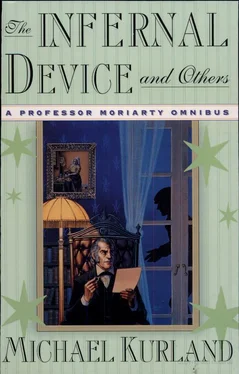Barnett found office space on the top floor of a small building on Whitefriars Street, just south of Fleet Street. He equipped it with a desk, a Grandall typewriter, a box of pencils, two reams of yellow paper, and a wastepaper basket, and felt at home. After much thought he found a sign painter and had him inscribe American News Serviceacross the door with B. Barnett in much smaller letters under it.
The next step, before he saw any of the British working press, was to establish his bona fides. There was no point in faking something that could just as easily be legitimate. He made up a list of New York and Boston newspapers that might take filler material from him — he'd worry about the rest of the country later. To start with, he sent a cable to his last employer, the New York World:
Now working for American News Service comma London stop will you take news at space rates plus cable charges questionmark we pay for query comma you specify inches
BENJAMIN BARNETT
Within four hours, the fastest turnaround time Barnett had ever seen on the transatlantic cable, he had his reply from the World, signed by Hardesty Gores, the managing editor himself:
Why arent you in prison
GORES
Barnett read the cable and scribbled a short reply for the boy to take back.
I died
BARNETT
The next morning, when Barnett arrived at the office to supervise the hanging of curtains and a few other necessary amenities, another cable from the World awaited him:
Want exclusive your personal story stop will take to one hundred inches space rates
GORES
So there was his first account. And an interesting challenge it would be, too, to write the story of his incarceration and escape without violating the terms of his agreement with the professor. He'd have to work on that one.
Barnett sent cables to the other papers on his list and turned his attention to getting to know the editors and journalists of Fleet Street. He started with the morning papers, which traditionally have the better local reporting staff. A morning paper usually has the late-breaking news and has to whip it into shape and dish it out for its readers' breakfast enjoyment. An evening paper has time to reflect and specializes in perspective and analysis of the news it gets from the morning papers. Or so it was in New York, and so Barnett assumed it would be in London.
Within the next two days, Barnett had consulted with the city editors of the Daily Telegraph, the Daily News, the Standard, and the Times. Under the pretext of doing a series of articles for the American market on crime in metropolitan London, he arranged to have access to the newspapers' clipping files and to be apprised of current happenings by messenger once a day. Newspapers tend to be very responsive to the requests of outside journalists who are not direct competitors. It was a cheap and effective sort of bread-casting.
Within a week, Barnett had replies from eleven East Coast dailies to the effect that they were willing to see his queries and buy from him at space rates if he had anything that interested them. "I have," he told Professor Moriarty over dinner, "quite inadvertently established myself in a business. I'm going to have to go out and hire that secretary you suggested just to keep up with the legitimate stories, not counting the research I'm doing for you. I didn't think it would be so easy."
"You must be considered a good journalist by your American peers," Moriarty suggested.
"I don't think that's it," Barnett said. "Not that I'm not a good journalist, you understand. I'm the best. But I think what these papers see is the notoriety value of my byline. Something like this: 'Mr. Barnett, our London correspondent, is the man who recently conducted a daring escape from a Turkish prison — no, make that a Turkish dungeon — after being tried and convicted for the murder of a British naval officer. A murder he assures us he did not commit. Full details in our Sunday edition.' "
"Fascinating. Clearly shows the advantages of compulsory literacy even in the most primitive cultures."
"Remember," Barnett told him, "that where I come from a woman who killed her lover with a nickel-plated revolver last year was acquitted of the crime when she told the jury that he had lied to her. And then she went on a vaudeville singing tour that took her to twenty-seven cities. Despite a voice like a bullfrog, she packed the house at every stop."
Moriarty put down his fork and stared at Barnett. "If I followed that properly," he said, "the moral of it would have to be, 'When in America keep nickel-plated revolvers out of the hands of women who can't sing.' " Then he chuckled and returned his attention to his pudding.
-
Barnett put an advertisement in the next morning's Daily Telegraph for a "secretary for a small news-office, conversant with the operation of typewriting machines. Reply to Box 252, Telegraph." He arranged for a messenger to deliver the replies to his office. By that afternoon's post he had sixteen replies, and by the following morning when he arrived at the office, eighty-seven.
He piled them all up on top of his new desk and settled down to go through them, with no clear idea of how to go about culling them down to manageable size. He found that a good many of the applicants eliminated themselves through unacceptable vagaries of grammar, syntax, or spelling. He counted the letters remaining: fifty-two. He had no interest in interviewing fifty-two people, and felt that he'd be even more helpless in deciding when actually faced with them than he was when merely faced with their letters of application. There were seventeen nearly identical letters in the pile. They each began, "I read with interest your advertisement in today's Daily Telegraph …" and continued, with little variation except for the name of the applicant, to precisely one inch from the bottom of the page. Barnett pulled them all out. Obviously copied from some popular letter-writing guide, he decided. Well, if he arbitrarily eliminated these as lacking in imagination, that still left thirty-five.
There was a knock at the door. Barnett looked up. More applications, no doubt. He put his pencil down. "Come in."
The office door opened, and a young lady entered. Barnett watched her come in, then stood up politely. And then he fell in love. This was not unusual, although it was the first time since he had reached London. Barnett had fallen in love every other day in Paris, and at least once a week in New York. But each time it was a new and unique emotion, and not at all to be compared with any of the times before. Still, it had happened enough that he was able to control the emotion and not allow it to interfere with his conduct. If his heart was beating a little faster than a moment before, if he was breathing a little deeper, well, it was a hot day.
"Excuse me," she said, "are you Mr. Barnett?"
"Indeed I am, Madam," he said. "How may I assist you?" It wasn't what he wanted to say, he told himself, wishing for poetic words and romantic images to come springing to his lips. But none sprang, and even if one had, there were conventions that would prevent him from uttering, one-tenth-part of one syllable. So he merely smiled foolishly at the young lady and waited for her to speak.
"I have brought your mail," she said, holding forth a packet of letters in her daintily gloved hand, "from the Daily Telegraph."
"Oh," Barnett said. He took the letters and dropped them on top of the others. "Thank you."
The girl set herself firmly before the desk, took a deep breath, and said, "I should like to apply for the position myself. Of secretary. In this office."
"Oh," Barnett said. "I mean, ah, I see. Here, take a seat, why don't you? How interesting. Ah…" He plopped back down into his chair as she sat herself in the straightback wooden chair by the side of the desk. "I'm sorry if I seem surprised," he said, "but I'm not really prepared to interview anyone yet. I mean, I hadn't expected to see anyone until tomorrow. At the earliest. How did you get here, by the way? And what is your name?"
Читать дальше












